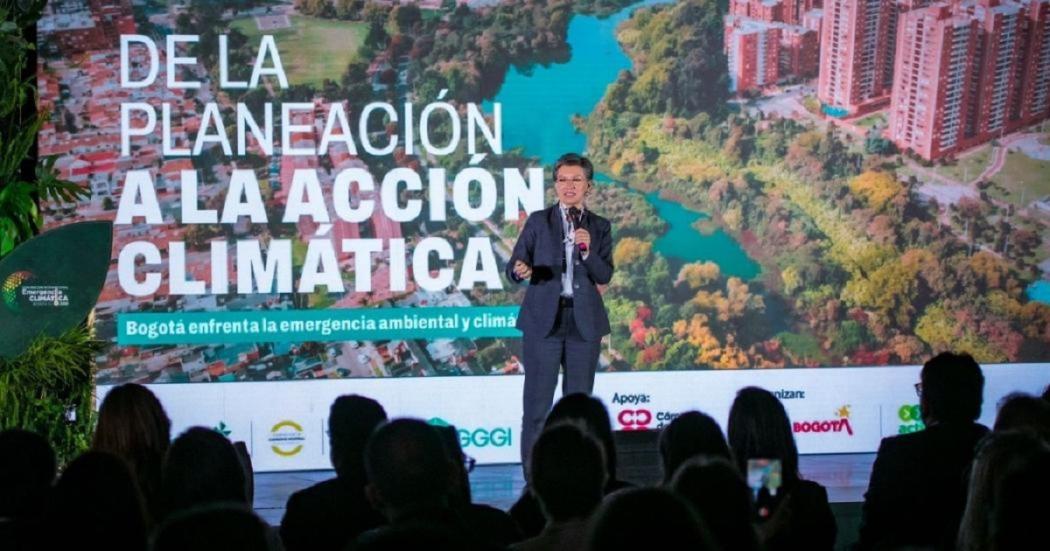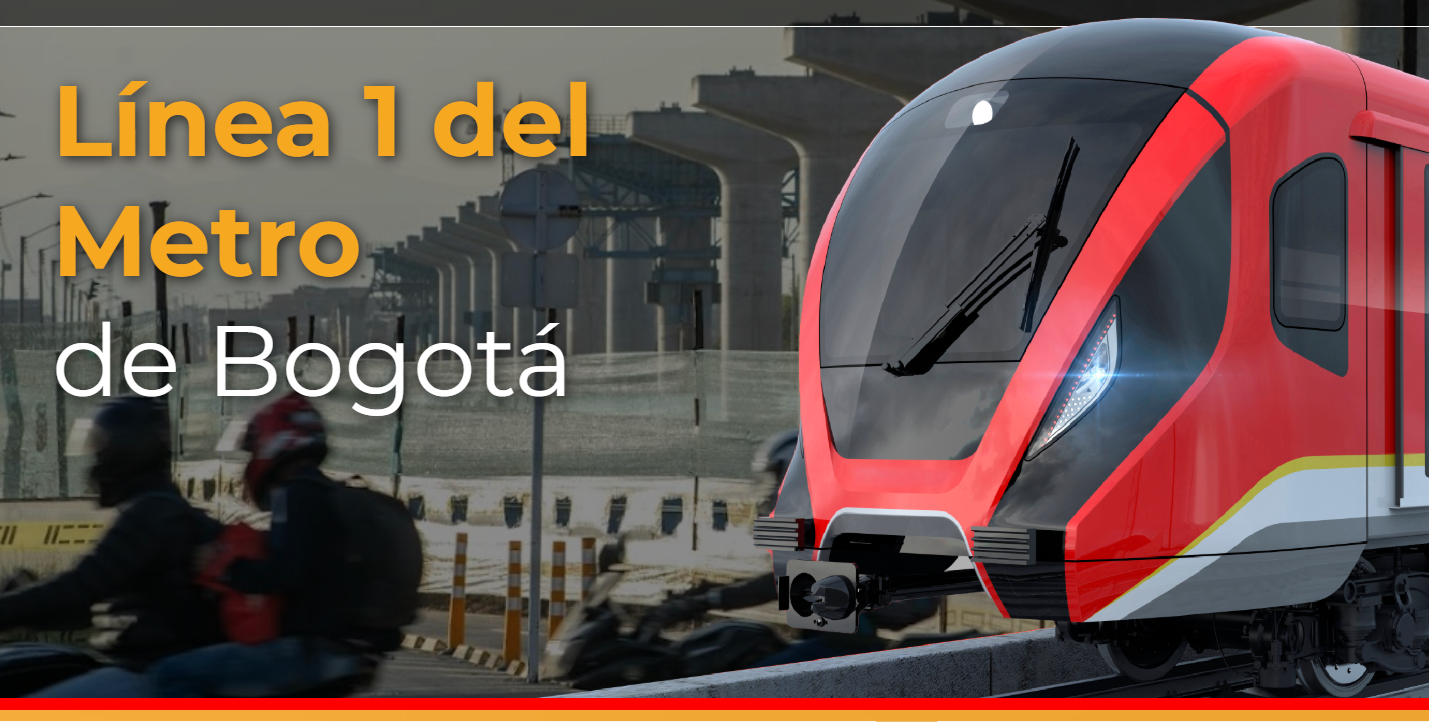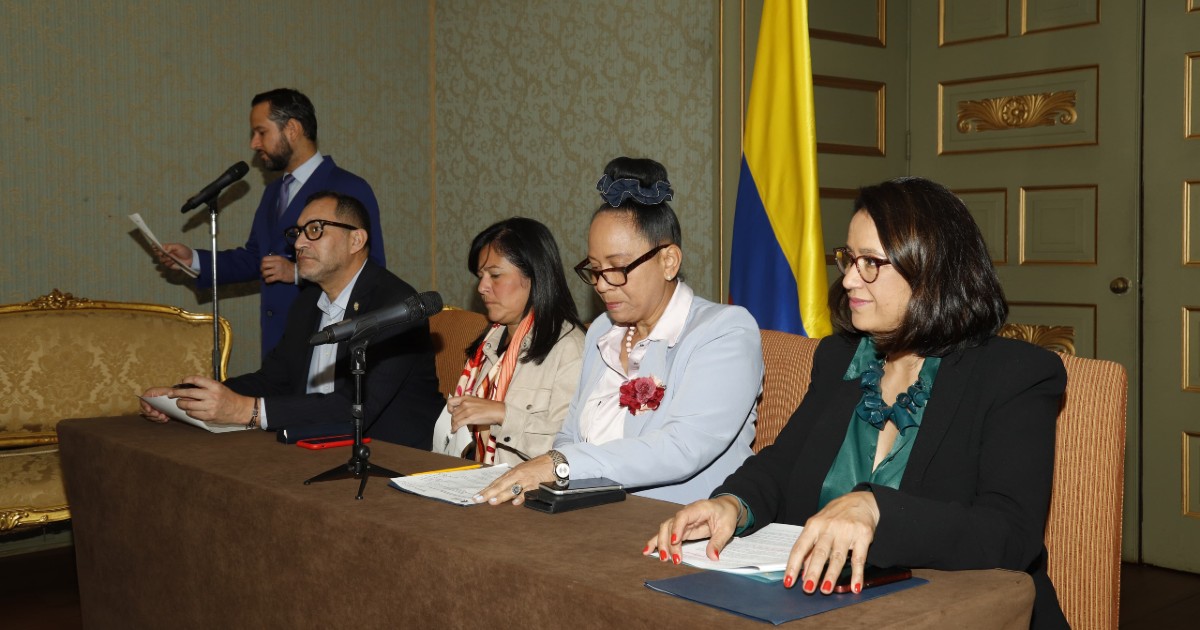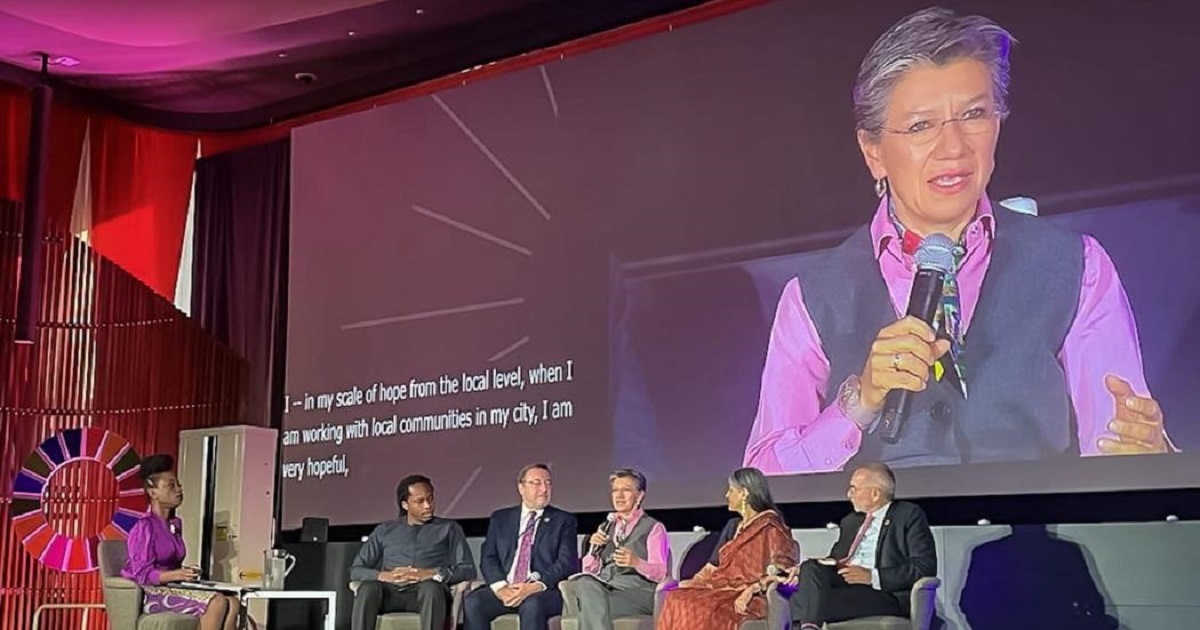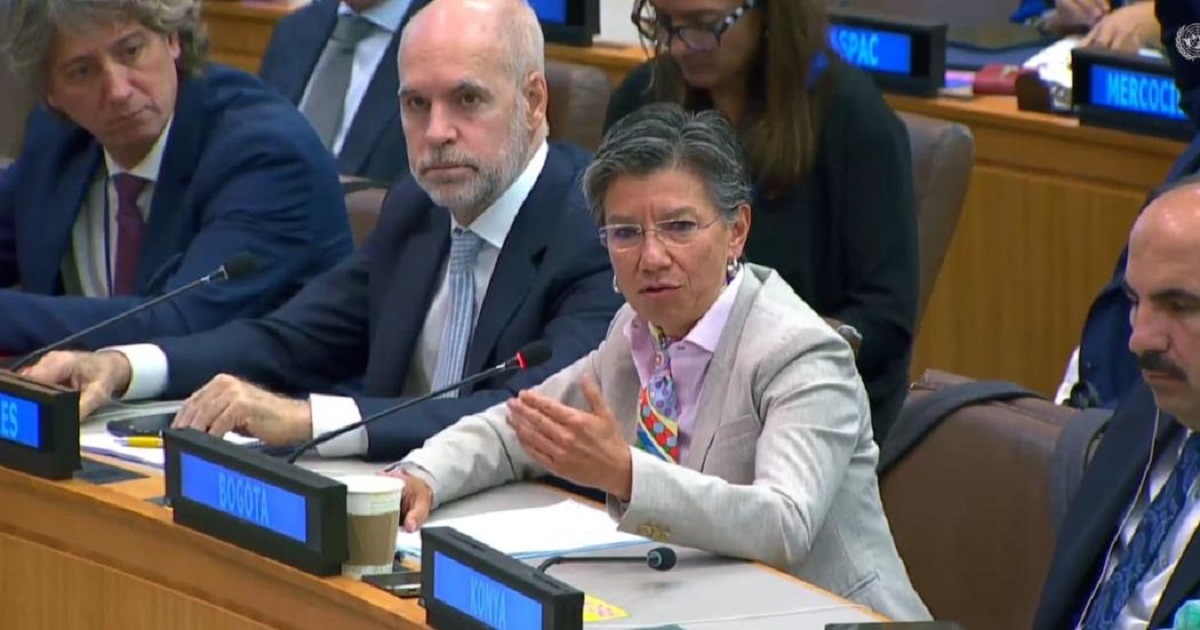Within the framework of the II International Climate Emergency Convention 'Bogotá 2023', Mayor Claudia López announced that the National Council for Economic and Social Policy (Conpes, by its Spanish acronym) has approved the Public Policy for Climate Action in the city. This plan is designed to meet the city's adaptation and mitigation goals for climate change while aligning with the country's international commitments.
During the opening of the event, which is taking place on September 19th and 20th, Mayor Claudia López expressed her gratitude: "Thank you so much for joining your voices, your knowledge, for dedicating your time to act and learn together, to do more, to accelerate investment and climate action. Our aim is to achieve the Sustainable Development Goals and the targets of the Paris Agreement."
Here, Mayor Claudia López shares a post with some images from the first day of the II International Climate Emergency Convention happening in Bogotá:
En Bogotá tenemos adoptados y en ejecución los planes de Acción Climática, Movilidad Sostenible y de Ordenamiento Territorial. El primero propone cuidar a las personas para que ellas cuiden el planeta:
— Claudia López Hernández (@ClaudiaLopez) September 19, 2023
•Cumplir el Acuerdo 790 de 2020 que declara la emergencia climática.… pic.twitter.com/v2W0TUetvL
This event is held in parallel to the 'Bogotá Goes Green' Week, where the city acknowledges the urgency of addressing climate change comprehensively and based on collective efforts. It's essential to remember that in 2020, a climate emergency was declared in the city, and since then, Bogotá's entities, led by the Secretariat of Environment, began to formulate a plan to address this phenomenon.
This plan evolved into the foundational document for the formulation of the Climate Action Public Policy, which was approved by the Conpes on September 13th. One of its primary objectives is to endure across subsequent administrations and become a city-wide commitment.
The policy is designed as a living organism, requiring periodic updates, with intervals of no more than five years. Its aim is to achieve carbon neutrality, resilience, and climate adaptation in Bogotá by 2050. It also includes initiatives to reduce the city's vulnerability to climate threats, improve governance and knowledge management, and decrease greenhouse gas emissions (GHG).
During the event, the Mayor of Bogotá added, "We hope that this week, world leaders convening at the United Nations will release funding for sustainable development, funding for the Bogotá Metro, the Antioquia River Train, the Maize District, the Education District, and the Mining District. The solutions are in the territories."
The Climate Action Public Policy will benefit all residents of Bogotá. This strategy involved the participation of 974 individuals representing various sectors, including industry, NGOs, academia, age and ethnic groups, public entities, and the general public, in its formulation and approval process. All helped to define the key and urgent aspects to be addressed by the policy.
The strategy includes long-term initiatives (by 2050) and aligns with the actions of existing public policies, such as the Zero and Low Emissions Mobility Public Policy. Furthermore, it contributes to fulfilling Agreement 790 of 2020, which recognizes the climate emergency as a top priority for public management.
The estimated total cost for implementing the Climate Action Public Policy is 58.6 trillion Colombian pesos by 2050. The majority of these costs are allocated to the Metro project (63% of the total), new TransMilenio trunk lines (18% of the total), and wastewater treatment plants (9% of the total). It's important to note that both the Metro and TransMilenio projects are already funded through agreements between Colombia's National Government and Bogotá.
Bogotá has successfully reduced greenhouse gas emissions (GHG):
Another significant announcement made during the Convention is that Bogotá is on a trajectory of emissions reduction that will allow it to comfortably meet its first mitigation target set for 2024: a 15% reduction in emissions compared to the baseline.
According to preliminary data from the 2022 Bogota's Emissions Inventory, the city reduced its emissions by 19.8% last year compared to the baseline projection. It's worth noting that emissions in the city began to decrease in 2019, reaching a minimum point in 2020, largely influenced by the effects of the pandemic.
"The first goal, I say it with great pride, of the Climate Action Plan was to reduce Bogotá's Greenhouse Gas Emissions (GHG) by 15% by 2024. I am pleased to announce that Bogotá has achieved its goal in 2023, and next year it may even reach close to a 20% reduction. It's through actions and results," explained Mayor Claudia López.
This achievement can be attributed to various factors, including the transition to telecommuting after 2021, the incorporation of an electric fleet in the public transport system, the expansion of cycling infrastructure, the implementation of shared bicycle programs, waste management initiatives, and greening efforts, among other strategies. These measures helped to keep GHG emissions lower than those recorded in 2019, particularly after the pandemic was brought under control.
Bogotá Supports the Animal Referendum to Prohibit Bullfighting
As part of the 'Bogotá Goes Green' Week, Mayor Claudia López announced Bogotá's support for the animal referendum promoted by Senator Andrea Padilla. This referendum aims to prohibit bullfighting by repealing Article 7 of the 1989 law, which currently contains exceptions allowing for acts of cruelty towards animals in the country.
In order to achieve this referendum, approximately four million signatures need to be collected. This marks the first step toward eliminating cruel acts and spectacles that violate the rights of animals, such as bullfights, bull runs, novilladas, tientas, becerradas, and rejoneo. It's important to note that cockfighting is not included in this initiative, as decided by the Senate plenary.
In a recent social media post, Mayor Claudia López confirmed Bogotá's support for the Animal Defense Referendum, which aims to prohibit acts of cruelty against animals. You can find more information on this support in her post:
Como ciudadana, bogotana y Alcaldesa me uno al Referendo por la Defensa de los Animales, propósito que ha liderado la Senadora @andreanimalidad y un valioso grupo de ciudadanos. Invitamos a los bogotanos y a los colombianos a que se sumen para que el Congreso de la República tome… pic.twitter.com/ag3hFWvE0C
— Claudia López Hernández (@ClaudiaLopez) September 19, 2023
"To all the citizens who have led this referendum, thank you for your bravery, courage, empathy, and love for the community. This is what citizenship is for—to exercise it. Here, we don't just talk; we take concrete actions, and signing to support the referendum to end cruelty towards animals is a concrete action. Bogotá is a city of actions, leading by example, leading through doing. I invite all Bogotá residents to get to know, understand, and support this referendum with their signatures and their hearts to eliminate cruelty against animals," stated Mayor Claudia López.
The event also featured Senator Andrea Padilla, who leads the referendum, and Adriana Estrada, the Director of Bogota´s Institute for Animal Protection and Welfare (Idpyba).
Senator Andrea Padilla emphasized, "We decided to initiate a referendum, which is a mechanism of citizen participation, so that four million Colombians, through their signatures, can let the State know that they are ready to eliminate the 1989 law that allows cruelty towards animals in Colombia. We are currently in the stage of collecting signatures, which corresponds to 10% of the electoral census."
It's important to highlight that in 2020, the Bogotá City Council approved Agreement 767, which discourages bullfighting practices in the city and currently prohibits Bogotá's Administration from allocating any resources to bullfights. It also bans the entry of minors to La Santamaría bullring and the consumption and sale of alcohol.
The Mayor's Office of Bogotá has demonstrated its commitment to the cause of animal welfare since the beginning of its administration by taking measures such as not hosting bullfighting events. This stance reflects concern for animal well-being and respect for all forms of life.
This commitment is also evident in the transformation of venues like the former Plaza de Toros La Santamaría into 'Plaza La Santamaría.' This space has hosted cultural events such as the Petronio Álvarez Pacific Music Festival and the Bronx Creative District, as well as parades. For December, there will be a second consecutive year of opening a space for local businesses to showcase their products at a Christmas fair.
Various Bogotá entities have achieved milestones in the defense and protection of fauna in the city. For instance, the Secretariat of Environment has invested approximately 38 billion Colombian pesos in the Center for the Care and Assessment of Wildlife in Bogotá (CAV). They have also successfully rehabilitated over 20,000 wild animals, with more than 13,000 individuals released in various regions of Colombia during the same period.
Additionally, through the Bogotá's Institute for Animal Protection and Welfare (Idpyba), significant efforts have been made to sensitize and educate the public. This effort is reflected in thousands of verification visits and animal care interventions, as well as programs that involve the community in animal protection, such as the adoption events for dogs and cats during this 'Bogotá Goes Green' Week, which will run until September 23rd.
Bogotá invites all citizens committed to the cause of animal welfare to join this effort and actively support the animal referendum. For those interested in collecting signatures, you can find the required format in the following link:
https://drive.google.com/file/d/11BOqnjRLR6PvV6rhiurgS8iEwbJJAc3a/view
Additionally, here is the livestream of the opening of the II International Climate Emergency Convention:
